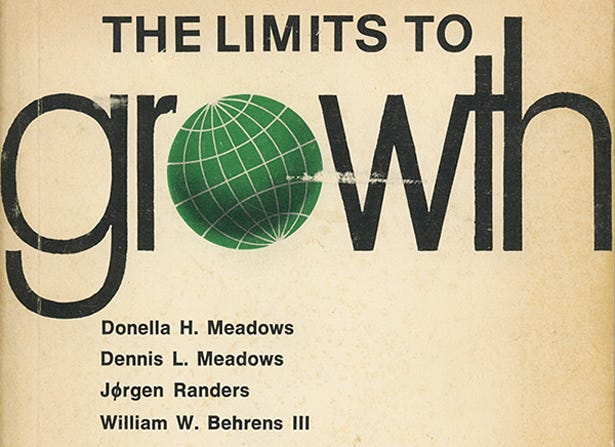⚡ Hey, America, let's not repeat our 1970s energy mistake
Also: What if a New Roaring ‘20s doesn’t happen? Some pro-progress thinkers respond.
In This Issue
The Essay: Hey, America, let's not repeat our 1970s energy mistake
5QQ Classic: What if a New Roaring ‘20s doesn’t happen? Some pro-progress thinkers respond.
Micro Reads: AI and business, the space economy, rewilding nature, and more
Quote of the Issue
“Energy is the only universal currency: one of its many forms must be transformed to get anything done. Universal manifestations of these transformations range from the enormous rotations of galaxies to thermonuclear reactions in stars. … Humans depend on this transformation for their survival, and on many more energy flows for their civilized existence.” - Vaclav Smil, Energy and Civilization
The Essay
Back in 1972, The Club of Rome — an international group of technocrats and businesspeople — released The Limits of Growth, an eco-pessimist report based on computer modeling from the Massachusetts Institute of Technology. Limits told an alarming, even apocalyptic story of an increasingly polluted and overpopulated planet running out of everything. By century’s end, modern industrial civilization would be well on its way to “ultimate collapse.” So Soylent Green with math, basically.
Preventing that dystopian outcome would certainly require rich nations to live worse. Much worse. Referring to Limits II, the 20-year update released in 1992, Nobel laureate economist William Nordhaus once pointed out that the report’s “proposals would limit our material aspirations to attaining the living standards of Somalia or Chad.” (Nordhaus, by the way, didn’t think much of the pessimistic MIT modeling: “It is hardly surprising that dead rabbits are pulled out of the hat when nothing but dead bunnies have been put in.”)
How much energy to be healthy and happy?
A modestly more positive take on economic growth and sustainability is offered by a new analysis from researchers at Stanford University. It suggests rich nations could provide their citizens with a decent life using far less energy. In the new paper “Human well-being and per capita energy use,” the authors look at nine benchmarks based on the UN Sustainable Development Goals: access to electricity, air quality, food supply, income inequality Gini coefficient, happiness, infant mortality, life expectancy, prosperity, and sanitation. With the exception of air quality, improvement peaked at or below 75 gigajoules of annual per-person energy consumption. From the paper:
Keep reading with a 7-day free trial
Subscribe to Faster, Please! to keep reading this post and get 7 days of free access to the full post archives.




